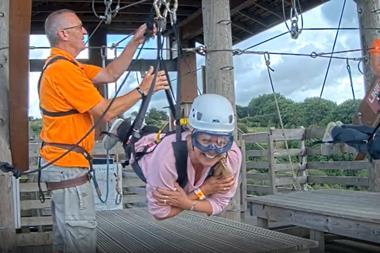
A couple of columns ago I wrote about my love of lists - or listicles as they are sometimes known - a new word for me and one I know I’ll love using. I have now discovered a fun listicle detailing a myriad of new and fascinating travel words garnered from languages around the world.
I think they explain well some the emotions we can feel when travelling, and I’d like to share my favourites with you. Read on if you’re suffering from sehnsucht and simply want to coddiwomple towards eudaimonia…
Eudaimonia: A Greek noun which means a state of being content and intensely happy whilst travelling, when everything feels right with the world; it can also be translated as “human flourishing or prosperity”. I experienced eudaimonia when I was in the Maldives a few years ago, and did nothing but read, eat delicious food, sunbathe, swim, and admire the sunsets. Total, utter bliss.
Quaquaversal: A Latin adjective, meaning to move in every direction at the same time. Something I often want to do in a new destination with so much to see…
Smultronställe: Swedish in origin, smultronställe means “place of wild strawberries”, but in travel terms it’s a special, secret place where you can relax and gain solace; a personal idyll, free from stress.
Trouvaille: A lovely noun with a French origin, commonly translated as “a lucky find”. It could be a superb restaurant, tucked away in a side street; a tiny café serving the best coffee in town; or a magical garden that takes your breath away. For me, it was stumbling upon an artist’s house in Bali, with Andrea Bocelli playing at full volume and peacocks strutting their stuff in the garden. A chance find I will never forget…
Sehnsucht: German in origin, this noun means a wistful yearning or pining for a far-off country; an almost mystical, indefinable nostalgia for past travels, places or people that you long to revisit and relive. I long to go back to Bali, twice visited and never forgotten – it touched my heart in a way I can’t really explain. True sehnsucht.
Peregrinate: First used in the late 16th century, this Latin verb is defined as travelling or wandering around from place to place, especially on foot. I peregrinate as often as I can around York – I’m fortunate enough to film there once a month and I never tire of the Shambles, York Minster, or its magnificent 13th century city walls.
Fernweh: The literal translation for this German noun is ‘distance-sickness’; it’s a craving to travel that’s even stronger than wanderlust - an ache for distant places.
Acatalepsy: A Greek noun meaning the impossibility of comprehending the universe – something that travel gives us a healthy awareness of. As Henry Miller once said: “One’s destination is never a place, but a new way of seeing things.”
Coddiwomple: This verb is actually English slang, and it’s defined as “travelling purposefully towards a vague destination” (if that isn’t an oxymoron I don’t know what is). I was coddiwompling recently in the Outer Hebrides, when I was hiking determinedly to the top of a mountain (OK – a very steep hill) and although I didn’t know how long it would take me, or exactly where the summit was, I knew I was heading in the right direction (i.e. up).
Strikhedonia: The origin is unknown, but strikhedonia is translated as the joy of being able to say “to hell with it”, or “the pleasure of leaving for somewhere new”. So why not book that trip you’ve always dreamed of? Stop making excuses and just go for it!













